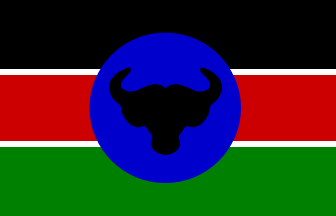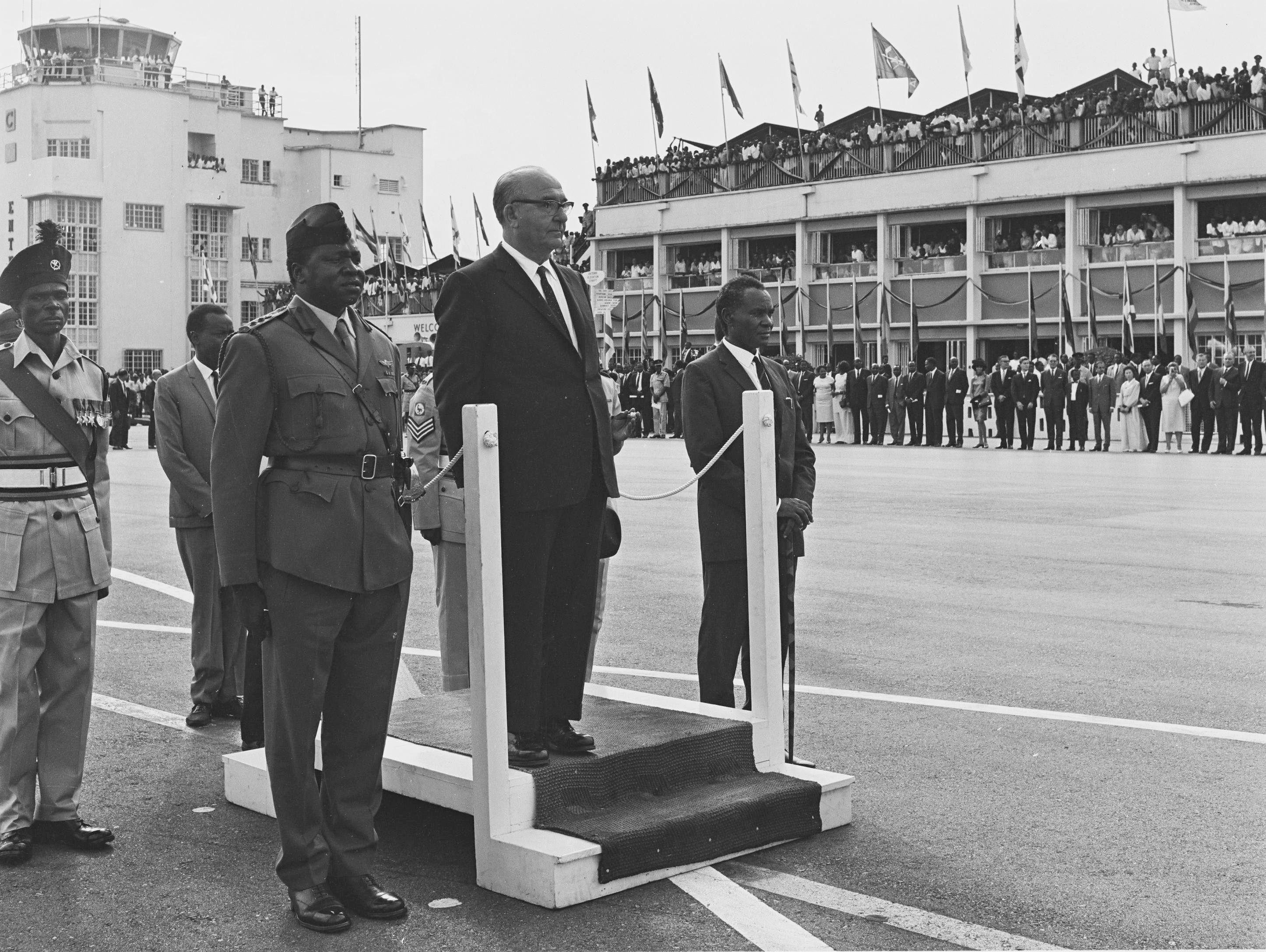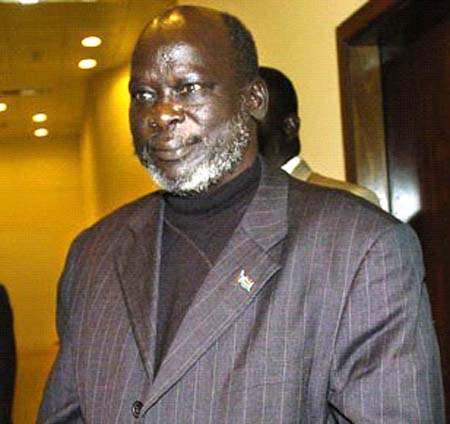|
Anyanya
The Anyanya (also Anya-Nya) were a southern Sudanese separatist rebel army formed during the First Sudanese Civil War (1955–1972). A separate movement that rose during the Second Sudanese Civil War were, in turn, called Anyanya II. ''Anyanya'' means "snake venom" in the Madi language.Wells, Victor C. and Samuel P. Dilla, December 1993,Colonization, Arabization, Slavery, and War, and War Against Indigenous Peoples of Southern Sudan" Fourth World Bulletin, Vol.3, No.1 History Anyanya was founded in 1963, as the Moru, Nuer, Lotuko, Madi, Bari, Acholi, Zande, Dinka, and other people from the entire southern region of Sudan waged a war against the Sudanese government. This mobilization came to be known as the Anyanya rebellion or the First Sudanese Civil War. It ended when the Anyanya signed the Addis Ababa Agreement with the Government in 1972. The Anyanya movement, although relatively strong, was weakened by the internal political wrangling amongst the leading politicians ... [...More Info...] [...Related Items...] OR: [Wikipedia] [Google] [Baidu] |
First Sudanese Civil War
The First Sudanese Civil War (also known as the Anyanya Rebellion or Anyanya I, after the name of the rebels, a term in the Madi language which means 'snake venom') was a conflict from 1955 to 1972 between the northern part of Sudan and the southern Sudan region that demanded representation and more regional autonomy. Half a million people died over the 17 years and the war was divided into four major stages: initial guerrilla warfare, the creation of the Anyanya insurgency, political strife within the government and establishment of the South Sudan Liberation Movement. Although the peace agreement ended the First Sudanese Civil War's fighting in 1972, it failed to completely dispel the tensions and addressed only some of the issues stated by Southern Sudan. The breakdown of the initial appeasement later led to a reigniting of the north–south conflict during the Second Sudanese Civil War, which lasted from 1983 to 2005. Background Colonial era Until 1956, the British gover ... [...More Info...] [...Related Items...] OR: [Wikipedia] [Google] [Baidu] |
Gordon Muortat Mayen
Gordon Muortat Mayen Maborjok (1922–2008) was a South Sudanese veteran politician and an advocate for the rights and freedom of the South Sudanese people. He was the President of the Nile Provisional Government (NPG) which led Anyanya I; Southern Sudan's first armed resistance to Khartoum which started in 1955. Muortat also served as Vice-President of the Southern Front (SF) and Foreign Minister in the Southern Sudan Provisional Government (SSPG). Early life Gordon Muortat Mayen was born in 1922 at Karagok village 10 miles South East of Rumbek. His father was a local chief of Patiop Clan of the Agar Dinka. Muortat was educated at Akot elementary from 1936 to 1942. He then attended Loka Nugent Junior Secondary School in Western Equatoria from 1942 to 1945. In 1951 he was among the first Southern Sudanese to graduate from Sudan Police College and was commissioned to police inspector where he rose through the ranks to become Chief Inspector of Police. Political career In 195 ... [...More Info...] [...Related Items...] OR: [Wikipedia] [Google] [Baidu] |
Uganda Army (1971–1980)
The Uganda Army (abbreviated UA), also known as Uganda Armed Forces, served as the national armed forces of Uganda during the dictatorship of Idi Amin (1971–1979). It mostly collapsed during the Uganda–Tanzania War, but remnants continued to operate in exile from 1979. These pro-Amin rebel forces continued to be called the "Uganda Army" and maintained a semblance of cohesion until 1980, when they fully fractured into rival factions. Following Uganda's independence in 1962, colonial units were transformed into the country's first national military which became known as the " Uganda Army". The military suffered from increasing ethnic and political tensions until UA commander Idi Amin overthrew President Milton Obote in 1971. The military was subsequently purged of perceived pro-Obote elements, resulting in a transformation of its setup and organization. Under Amin's rule, the UA became dominated by people of northwestern Ugandan, Sudanese, and Zairean origin, resulting in it being ... [...More Info...] [...Related Items...] OR: [Wikipedia] [Google] [Baidu] |
Anyanya II
Anyanya II is the name taken in 1978 by a group of the 64 tribes of South Sudan dissidents who took up arms in All of Sudan. The name implies continuity with the Anyanya, or Anya-Nya, movement of the First Sudanese Civil War (1955-1972). When the Addis Ababa Agreement fell apart in 1983, marking the beginning of the Second Sudanese Civil War, the Sudan People's Liberation Movement/Army (SPLM/A) was founded. Competition between Anyanya II and the SPLM/A led to the eventual defeat of Anyanya II. Some of its members were incorporated into the ranks of the SPLM/A, and others were consolidated into a militia supported by the government of Sudan.Wells, Victor C. and Samuel P. Dilla, December 1993,Colonization, Arabization, Slavery, and War, and War Against Indigenous Peoples of Southern Sudan" Fourth World Bulletin, Vol.3, No.1 Those who did not join either came to form, along with tribal militias that emerged in response to the lawlessness of some SPLM/A units, the South Sudan Defense ... [...More Info...] [...Related Items...] OR: [Wikipedia] [Google] [Baidu] |
Godwin Sule
Godwin Sule (died 11 March 1979) was a high-ranking Sudanese-born Ugandan military officer who held important commands in the Uganda Army during the dictatorship of President Idi Amin. A native of southern Sudan, he fought as rebel in the First Sudanese Civil War before migrating to Uganda. There he rose to head of the Malire Battalion and later the Paratroopers Military School. Regarded as one of the most talented soldiers in the Uganda Army during Amin's rule, Sule was tasked with leading the last major Ugandan counter-offensive during the Uganda–Tanzania War of 1978–79. This operation culminated in the Battle of Lukaya of 10–11 March 1979, during which Sule was killed under unclear and disputed circumstances. His death resulted in the collapse of the Ugandan offensive, contributing to the eventual overthrow of Amin's regime. Biography Rebel activity and rise in the Uganda Army Sule originated from southern Sudan. He was Christian as well as an ethnic Sudanese-Nubian a ... [...More Info...] [...Related Items...] OR: [Wikipedia] [Google] [Baidu] |
Second Sudanese Civil War
The Second Sudanese Civil War was a conflict from 1983 to 2005 between the central Sudanese government and the Sudan People's Liberation Army. It was largely a continuation of the First Sudanese Civil War of 1955 to 1972. Although it originated in southern Sudan, the civil war spread to the Nuba mountains and the Blue Nile. It lasted for 22 years and is one of the longest civil wars on record. The war resulted in the independence of South Sudan six years after the war ended. Roughly two million people died as a result of war, famine and disease caused by the conflict. Four million people in southern Sudan were displaced at least once (and normally repeatedly) during the war. The civilian death toll is one of the highest of any war since World War II and was marked by numerous human rights violations, including slavery and mass killings. Background and causes The Sudanese war is often characterized as a fight between the central government expanding and dominating peoples ... [...More Info...] [...Related Items...] OR: [Wikipedia] [Google] [Baidu] |
Idi Amin
Idi Amin Dada Oumee (, ; 16 August 2003) was a Ugandan military officer and politician who served as the third president of Uganda from 1971 to 1979. He ruled as a military dictator and is considered one of the most brutal despots in modern world history. Amin was born in Koboko in what is now northwest Uganda to a Kakwa father and Lugbara mother. In 1946, he joined the King's African Rifles (KAR) of the British Colonial Army as a cook. He rose to the rank of lieutenant, taking part in British actions against Somali rebels and then the Mau Mau Uprising in Kenya. Uganda gained independence from the United Kingdom in 1962, and Amin remained in the army, rising to the position of major and being appointed commander of the Uganda Army in 1965. He became aware that Ugandan President Milton Obote was planning to arrest him for misappropriating army funds, so he launched the 1971 Ugandan coup d'état and declared himself president. During his years in power, Amin shifted from be ... [...More Info...] [...Related Items...] OR: [Wikipedia] [Google] [Baidu] |
1971 Ugandan Coup D'état
The 1971 Ugandan coup d'état was a military coup d'état executed by the Ugandan military, led by general Idi Amin, against the government of President Milton Obote on 25 January 1971. The seizure of power took place while Obote was abroad attending the Commonwealth Heads of Government Meeting in Singapore. Amin was afraid that Obote might dismiss him, and installed himself as dictator. The 1971 coup is often cited as an example of "class action by the military", wherein the Uganda Army acted against "an increasingly socialist regime whose egalitarian domestic politics posed more and more of a threat to the military's economic privileges". Background A rift had developed between Amin and Obote, exacerbated by the support Amin had built within the army by recruiting from the West Nile region, his involvement in operations to support the rebellion in southern Sudan and an attempt on Obote's life in 1969. In October 1970, Obote took overall control of the armed forces, reducing ... [...More Info...] [...Related Items...] OR: [Wikipedia] [Google] [Baidu] |
Aggrey Jaden
Aggrey Jaden Ladu (1924, 1927, or 1928 — 1985 or 1987) was a South Sudanese politician, Biography Aggrey Jaden Ladu is from the Pojulu ethnic group, known for promoting the independence of South Sudan from Sudan. He was born in Loka village in the mid to late 1920s and Education Aggrey Jaden Ladu attended Loka Church Missionary Society CMS Elementary school in the period 1936–1944, before proceeding to Nabumali secondary school in Uganda, where he studied from 1945 to 1949.He joined University of Khartoum in 1950 and graduated in the school of Arts in 1954 and joined Sudan administration and was trained as a sub – mamur administrator in 1955. Upon the independence of Sudan in 1956, he was accused of refusing to lower the British flag and replacing it with the new Sudan independence flag. He was transferred to Malakal in 1957 but got dismissed from the Sudan civil service in 1958 after the coup d'état of General Ibrahim Abboud. He left the country in search of a job and ... [...More Info...] [...Related Items...] OR: [Wikipedia] [Google] [Baidu] |
John Garang
John Garang de Mabior (June 23, 1945 – July 30, 2005) was a Sudanese politician and revolutionary leader. From 1983 to 2005, he led the Sudan People's Liberation Army (SPLA) after the Second Sudanese Civil War, the comprehensive peace agreement of 2005 was signand he briefly served as Vice President of Sudan, First Vice President of Sudan for 3 weeks until his death in a helicopter crash on July 30, 2005. A Developmental economics, developmental economist by profession, Garang was a major influence on the movement that led to the foundation of South Sudan. Early life and education Garang, who is regarded as the founding father and symbol of unity in today's South Sudan is a member of the Dinka people, Dinka ethnic group. He was born into a poor family in Wangulei village Twic East County in the upper Nile region of Sudan. An orphan by the age of ten, he had his fees for school paid by a relative, going to schools in Wau, Sudan, Wau and then Rumbek. In 1962 he joined the First Su ... [...More Info...] [...Related Items...] OR: [Wikipedia] [Google] [Baidu] |
Milton Obote
Apollo Milton Obote (28 December 1925 – 10 October 2005) was a Ugandan political leader who led Uganda to independence from British colonial rule in 1962. Following the nation's independence, he served as prime minister of Uganda from 1962 to 1966 and the second president of Uganda from 1966 to 1971, then again from 1980 to 1985. He founded the Uganda People's Congress (UPC) in 1960, which played a key role in securing Uganda's independence from the United Kingdom in 1962. He then became the country's prime minister in a coalition with the Kabaka Yekka movement/party, whose leader King Mutesa II was named president. Due to a rift with Mutesa over the 1964 Ugandan lost counties referendum and later getting implicated in a gold smuggling scandal, Obote overthrew him in 1966 and declared himself president, establishing a dictatorial regime with the UPC as the only official party. Obote implemented ostensibly socialist policies, under which the country suffered from severe co ... [...More Info...] [...Related Items...] OR: [Wikipedia] [Google] [Baidu] |
Oliver Batali Albino
Oliver Batali Albino (11 November 1935 – 4 January 2020), also sometimes referred to as Oliver Albino Batali, was a South Sudanese politician and civil servant. Background Oliver Albino was born on 11 November 1935 in Yei, South Sudan. He was a member of the Makaraka or Adio ethnic group in the Yei – Maridi area of Central Equatoria, closely related to the Azande ethnic group. He completed secondary school in Rumbek and studied at the University of Khartoum. In the early 1960s he went in exile and joined the Anya-Nya resistance movement in Kenya. In 1965 Oliver Albino became part of the Sudan African National Union (SANU) in Uganda. In the late 1960s and early 1970s he was a teacher at a secondary school in Gulu, northern Uganda. During that period he wrote his first book, ''The Sudan: a Southern Viewpoint'' (Oxford University Press, 1970). Oliver Albino was also a member of the Southern Sudan Liberation Movement’s delegation to the Addis Ababa peace talks of 1972. ... [...More Info...] [...Related Items...] OR: [Wikipedia] [Google] [Baidu] |





